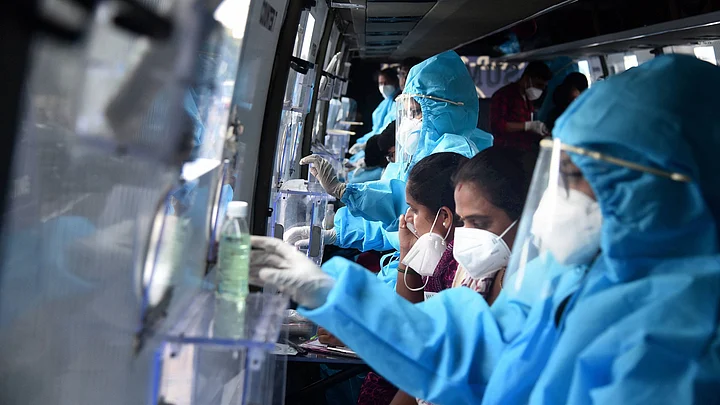After initially validating TrueNat test machines for screening patients for COVID-19, the Indian Council of Medical Research (ICMR) issued revised guidelines on 19 May, calling the test a ‘comprehensive assay for screening and confirmation of COVID-19 cases’.
The machine, manufactured by Goa-based Molbio Diagnostics, was originally developed for diagnosing tuberculosis. After the ICMR approval, it is being sought by various states that may not have the adequate laboratory network to carry out conventional RT-PCR tests, The Indian Express reported. Uttar Pradesh, Bihar, Jharkhand, Chhattisgarh, Odisha, Telangana and Andhra Pradesh have already ordered or received these machines.
But how does the TrueNat test work and what makes it different from the traditional RT-PCR tests?
How It Works
The TrueNat is a chip-based RT-PCR test kit. Earlier, it was only being used as a screening test as it could just identify the E-gene in the novel coronavirus. But now, the new machines can also detect the RdRp enzyme found in the RNA of the virus, which allows them to assess the presence of SARS-CoV-2 in a sample and confirm COVID-19 accordingly.
They are different from the conventional tests in their speed, cost as well as convenience of application. According to the Indian Express report, the machine is portable, which makes it useful in remote districts from where collecting and sending swabs to big laboratories may not be possible. The TrueNat kit is priced at around Rs 1,300.
For the TrueNat test, the swab is collected at kiosks set up at various locations and dipped in a viral transmission medium where it gets neutralised. It then is shifted to another liquid in which the cells break and the impurities are removed. Finally, it is transferred into a cartridge where the process of RNA extraction takes place.
“While the miniature well is where the reagent activates the RNA, it is the chip that is fed with all the calculations of the viral load that helps in detecting whether a person is carrying the virus or not. Unlike in the conventional RT-PCR tests, the reagents do not require extreme temperatures in this process, and the quantity of swab required for testing is also much less,” said the Indian Express report.
Shiva Sriram, national sales manager of Molbio Diagnostics is quoted in the report as saying, “The machine is portable and can be carried in a briefcase, is battery operated with one charge lasting ten hours. An eight-hour shift gives 45 tests and most of the states are currently running three shifts a day,” said Sriram. “Most states have also ordered for the four slot machine which allows four tests to be conducted simultaneously.”
The ICMR, in its guidelines has said, “No further RT-PCR based confirmation is required for samples that are positive after step 2 of the assay (RdRp gene) above. All positive and negative results must be reported to the ICMR portal in real-time manner.
(With inputs from The Indian Express)
(At The Quint, we question everything. Play an active role in shaping our journalism by becoming a member today.)
